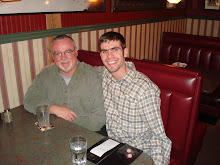1.29.2009
back to the talk back
1.27.2009
indians and redskins and blackhawks, oh my! (1)
works cited (running)
"Funny Spanish Phrases and Sayings." Learn Spanish. (2007) http://www.learn-spanish.com.mx/spanish-phrases/funny-spanish-phrases/
Jensen, R. "No Irish Need Apply." Scholar's Guide to WWW (Feb 2008). [http://tigger.uic.edu/~rjensen/poole.gif]
McClymer, J. F. "Facsimile of Cherokee Alphabet Before Printing." 19th Century U.S. Syllabus (2007). [http://www.assumption.edu/users/McClymer/his260/CherokeeAlphabet.jpg]
Parker, J. NewsforNatives.com (Florida Today) (2006). [http://newsfornatives.com/blog/wp-content/uploads/2008/02/native-cartoonimmigration1.gif]
Phillips, S. (2008, Jan 25) 2004 Chief Wahoo protest in Cleveland part 1 of 3. Video posted to [http://www.youtube.com/watch?v=QASq9IbvtTk]
Phillips, S. (2008, Nov 14). Chief Wahoo Protest on Baseball Opening Day 2007 Part 1 of 3. Video posted to [http://www.youtube.com/watch?v=sqeqEP2BMxg]
Phillips, S. (2008, Nov 14). Chief Wahoo Protest on Baseball Opening Day 2007 Part 2 of 3. Video posted to [http://www.youtube.com/watch?v=x6G_BI0_qFg&feature=related]
Phillips, S. (2008, Dec 10) Protests against Chief Wahoo 1/4. Video posted to [http://www.youtube.com/watch?v=avfQb-YwGqo]
Spring, Joel. Deculturalization and the Struggle for Equality: A Brief History of the Education of Dominated Cultures in the United States. (5th ed.). McGraw-Hill, New York, 2007, 15, 24, 25, 28, 52, 61, 73, 78, 95.
Spring, J. Wheels in the Head: Educational Philosophies of Authority, Freedom and Culture from Socrates to Human Rights. (2nd ed.) Lawrence Erlbaum Associates, 2006, 5,6.
Swing, P. (2008, Sep 30). Why is Barack Obama Black? Video posted to [http://www.youtube.com/watch?v=hUSgRQCvopc]
Takaki, Ronald. A Different Mirror: A History of Multicultural America. Back Bay Books. Little, Brown and Co. 1994, 69, 88, 107, 151, 163-64, 220, 230-31, 255, 308, 317, 321, 327, 355.
Wise, T. "White Like Me: Reflections on Race from a Privileged Son." (Nov 2007) [http://www.timwise.org/]
(2006, Aug 30). Ohio & the Amish. Video posted to [http://www.youtube.com/watch?v=x3Tkprzooxw]
(2006, Nov 12). Yao Ming Visa Commercial. Video posted to [http://www.youtube.com/watch?v=I7rm-yadkGY
(2006, Nov 19). The Amish Tragedy. Video posted to [http://www.youtube.com/watch?v=tkNeRzCnne4]
(2007, Aug 16). Explaining the Amish Way of Life--VOA Story. Video posted to [http://www.youtube.com/watch?v=PAgSCTdnrhk]
(2007, Sep 23). The Jena Six (6) Story ESPN Outside the Lines. Video posted to http://www.youtube.com/watch?v=3SrIEM8X0qA&feature=related
(2009, Jan 16). Cristo Rey High School on 60 Minutes. Video posted to [http://www.youtube.com/watch?v=vxl0zrKOqIQ&feature=related&fmt=18]
[http://i274.photobucket.com/albums/jj270/cillialou1124/z72920468.jpg] (paintbrush)
[https://blogger.googleusercontent.com/img/b/R29vZ2xl/AVvXsEhNmNv6eup5Azx8MiwktK-JU3HwkzHmsywYWbQMJS-idsd0jsQJpE7wm_x55hsZFJOQobs7r7mtaMZiOqSNvakevq_2m8xZ3JhrDSRmQxnCDeJfm1icVtVuiGEGwWKEaVSCeLTPhFx4RqvS/s320/Cleveland+Indians+Logo.gif] (cleveland indians logo)
http://uktv.co.uk/images/standarditem/EX1/5175.jpg (slave ad)
http://lincoln.lib.niu.edu/fimage/lincolnimages/us_1840_slvperc_053101_400.jpg (slave map)
http://socialitereport.com/photos/hobokenparade.jpg (leprachaun picture)
http://sports.espn.go.com/mlb/worldclassic2009/index (world baseball classic logo)
color commentary plus q & q (life notes #1)
important quotes:
(on the deculturalization of Native Americans)
"What good man would prefer a country covered with forests and ranged by a few thousand savages to our extensive Republic, studded with cities, towns, and prosperous farms...filled with all the blessings of liberty, civilization, and religion?" (Takaki, 88).
"Now can any one doubt that this system [schools in Indian Territory] would not lift them in a single generation to a level with ourselves?" (Spring, 24).
"These Presbyterians could accept nothing less than the total rejection of the tribal past, and the total transformation of each individual Indian, a cultural destruction and regeneration to be brought about by the Gospel of Jesus Christ" (Spring, 25).
"I fought through the Civil War and have seen men shot to pieces and slaughtered by thousands, but the Cherokee removal was the cruelest work I ever knew" (Spring, 28).
(on the final frontier battle at Wounded Knee)
"After the storm passed, the soldiers threw the dead Indians into a long trench, their frozen bodies 'piled one upon another like so much cordwood, until the pit was full.' Many of the corpses were naked: the 'ghost shirts' had been stripped from the dead as souvenirs. A photograph of Big Foot lying in the snow showed the contorted body of the chief, his hands still trying to shield himself and his face fixed in a grotesque grimace by the horror he had witnessed. For Indian America, Wounded Knee violently symbolized the end of the frontier" (Takaki, 230-31).
some head-scratchers:
question #1: Why didn't the Native Americans resist or fight back against the Europeans as they were forcing them from their homelands? Was it a matter of their tribal personality & value systems not to fight back or were they just being compliant?
question #2: Besides the reputation of Andrew Jackson, which other US presidents' reputations would have been tarnished had the true stories been revealed in US and American history textbooks?
color commentary plus q & q (life notes #1)
Likewise, Spring's brief survey of late 18th-early 19th century Anglo-Saxon America provided me with a rich and stable foundation with which to begin making connections between both texts. I was immediately drawn to the horrendous conditions of the Native American people as the early Europeans began to invade America (not as individuals escaping persecution overseas, but folks whose main objective was to command and conquer anything that frustrated their financial & political plans). It is unfortunate that is taken this long for me to be exposed to some of the truths of our nation's dark history.
some quotes to ponder (hmmm....):
(On the Irish)
“Viewing blacks as 'a soulless race,' some Irish said they 'would shoot a black man with as little regard to moral consequences as they would a wild hog' ” (Takaki, 151).
“...they had been warned by John Quincy Adams: ' [the Irish] come to...a life of labor—and, if they cannot accommodate themselves to the character, moral, political, and physical, of this country...the Atlantic is always open to them to return to the land of their fathers...They must cast off their European skin, never to resume it. They must look forward to their posterity rather than backward to their ancestors; they must be sure that whatever their own feelings may be, those of their children will cling to the prejudices of this country” (Takaki, 163-4).
(On Native Americans)
"The utmost good faith shall always be observed towards the Indians, their lands and property shall never be taken from them without their consent; and in their property, rights and liberty, they never shall be invaded or disturbed" (Spring, 15).
(On Jews)
"The Jews 'reaped more and more dislike as they bettered themselves.' The more avidly they reached out for acceptance and participation in American life, the more their reputation seemed to suffer" (Takaki, 308).
"I work, and I work, without rhyme, without reason--produce, and produce, and produce without end. For what? and for whom? I don't know, I don't wonder--since when can a whirling machine comprehend? No feelings, no thoughts, no the least understanding; this bitter, this murderous drudgery drains the noblest, the finest, the best and richest, the deepest, the highest that living contains. Away rush the seconds, the minutes and hours; each day and each night like a wind-driven sail; I drive the machine, as though eager to catch them, I drive without reason--no hope, no avail" (Takaki, 292).
outstanding questions:
question #1: Why were immigrants from Ireland and black slaves unable to get along throughout the 19th century, especially when both communities were being oppressed and treated in the most inhumane ways? Was it merely a result of their skin color or were there societal and cultural advantages that the Irish held over their fellow black neighbors?
(I have a lot of sympathy for my Irish ancestors who sacrificed all that they had in order to start anew in the "free world." however, I lose a lot of respect for them when i discover in my readings that they treated members of the black community in 19th century America with just as much hatred, violence and hostility as many of the traditional slave masters did around that same time period.)
question #2: Assuming that they had access to this information, how did members of the black community react to the news of the blight of the Irish potato famine of the 1845? Did their knowledge (or lack thereof) change how they interacted with the Irish people when they reached America? If not, how come?














